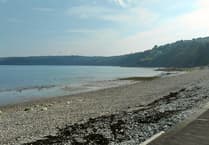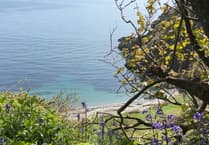Pet terrapins have been frequently abandoned by their owners for decades in various ponds on the island and, sadly, this trend continues.
Perhaps when people buy a tiny terrapin (all too often via the internet) when it is not much bigger than a 50p coin, they are assured buy the sellers that it won’t get much bigger than that.
And once the said pet reaches the size of a small dinner plate, it is sometimes easier for the owner to convince themselves that they are doing the animal a kindness by releasing it into the wild, rather than committing to the expensive and time consuming care that these exotic animals require.
Most likely, the reason this trend continues is that people are genuinely unaware of the negative effects of the terrapin on the local environment, and the distressing circumstances the animal will quickly find itself in.
Terrapins require specific water temperatures and basking areas orientated towards the sun, not to mention good access to suitable food.
In cool areas, terrapins may be unable to get their body temperature high enough to move around, let alone eat and digest food.
The ManxSPCA takes in several terrapins every year.
They have been abandoned in local ponds and left to die a slow death as non-natives in our Manx environment.
Our advice to owners is to bring the terrapins to Ard Jerkyll where we can house them until we can find them new homes.
And the ManxSPCA’s advice to anyone thinking of buying a terrapin, or any pet, is to do your research thoroughly beforehand.
Terrapins are complex to maintain and their diet needs to be supplemented with vitamins. They need enough UV light for them to be able to synthesise vitamin D3, which helps them absorb calcium from their food.
Without supplements or enough sunshine or UV light, terrapins (both feral and in captivity) can suffer from ailments such as shell rot, which results in a weak and spongy shell. Vitamin A deficiency can lead to swollen eyelids which means they eventually fuse together, making the terrapin blind and unable to feed.
Aside from the obvious ethical implications of abandoning terrapins, and the fact that it is illegal to do so (under the Cruelty to Animals Act 1990), their presence may also have a negative impact on our environment.
Where terrapins are released into small ponds, or where a large number of them are present, they can over consume vegetation in the pond.
This may seem trivial but not only does this mean they exhaust their own food source, they also affect our native wildlife that uses pond vegetation both as a food source and a habitat.
Terrapins may also carry diseases that can transfer to native wildlife, in particular a fungal disease that can affect frogs and birds, and some carry salmonella which can transfer to humans.
We have two terrapins at Ard Jerkyll at the moment and they need new owners who can provide them with the care they require.
Ideally they will be able to live in a filtrated outdoor pond with access to indoor ‘basking zones’ (one for each terrapin) where they can increase their body temperatures, when they need to, under a heat lamp.
A varied diet is essential to keep terrapins healthy, and they need a balance of fresh fish and live invertebrate food, alongside specialist terrapin food.
They also require specialist supplements to provide them with the necessary vitamins and minerals.
If you are able to give one, or more, of these amazing creatures a new home, and you understand the commitment required (terrapins can live for up to 30 years), please contact Jane Gregory on [email protected] or call her on 851672 (option three).


.jpeg?width=209&height=140&crop=209:145,smart&quality=75)


Comments
This article has no comments yet. Be the first to leave a comment.